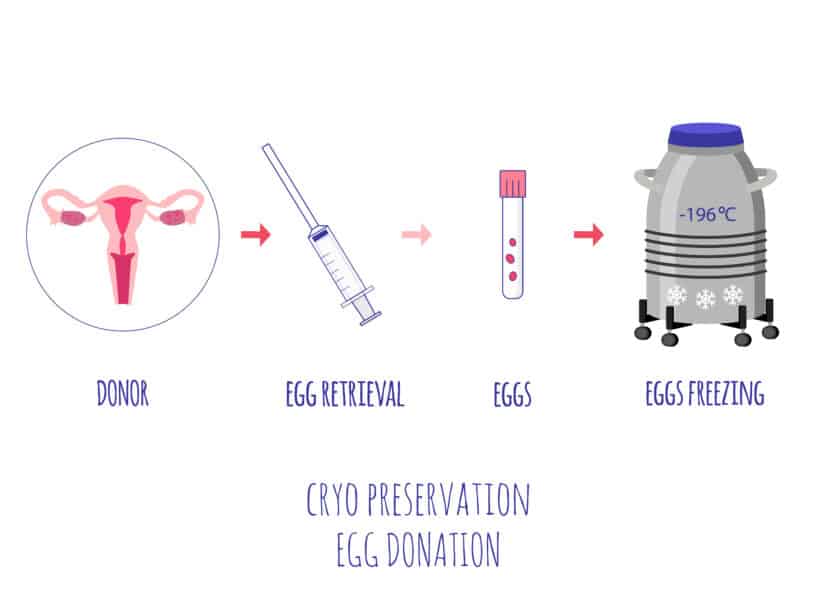If you are one among those who research cryopreservation, your search for information should end here for this page will help you with,
Eight Important Considerations Before You Decide on Freezing Your Eggs
Freezing Your Eggs When You Are Young Is a Better Option
- Women freeze their eggs for various reasons. The most important reason that women across the world give is that they do not have a partner with whom they have a relationship conducive to bearing a child. Nevertheless, the other reason is they want to do something in their career before having a child. Though there is no perfect age for a woman to freeze her egg, it is better to do it in her 20s or in early 30s.
- When you are young, you will have a higher ovarian reserve of eggs, and they are healthier. This will increase your chance of becoming pregnant. By undergoing a fertility hormones test, you will get to know about your ovarian reserve, and whether you should opt for egg freezing or not from your doctor. Women above 38 years are advised not to go for egg freezing. Apollo Fertility offers services in major cities across India. Explore the procedure and cost of egg freezing in Bengaluru, Chennai, Delhi-NCR, and other cities.
Also, Read: Egg Quality in Your 30’s
How Invasive Is the Egg Freezing Procedure?
- Egg freezing is a lengthy process with several steps. First, you are required to undergo mandatory screening for ovarian reserve testing and infectious diseases using an ultrasound and drawing a blood sample. The next step is having gonadotrophin hormones injection to stimulate your ovaries to produce more than one egg during the menstrual cycle. You are examined to determine the drugs’ effect on the ovulation induction, and once the follicles are ready, an HCG injection is administered to help the maturation and ovulation of the eggs.
- The doctor conducts the egg retrieval procedure through a transvaginal ultrasound aspiration, where the follicles are located inserting a small ultrasound probe into the vagina. Then the eggs are carefully removed using a suction device, which takes about 20-30 minutes. Once the eggs are retrieved, they are frozen to -196° C using either a slow-freezing or Vitrification technique.
- In the slow-freezing method, the eggs are frozen slowly using programmable freezers by adding cryoprotectants in low concentrations initially, and then, in high concentrations when the temperature declines and the metabolic rates of the eggs decreases. The Vitrification technique helps cool the eggs rapidly, and so high concentrations of cryoprotectants are used to avoid the forming of intracellular ice crystals. Once the eggs are frozen, they are stored in liquid nitrogen. When compared to slow freezing, Vitrification offers high survival rate of 94.8 percent.
How Likely I Will Have a Baby in Future?
Some studies show that the chance of leading to a live birth with a single frozen egg is only 2-12 percent. However, there are not many studies conducted with regard to this. The success of having a baby with frozen eggs depends on the factors such as the woman’s age, quality of male partner’s sperm, thawing process and viable eggs.
Is Freezing Eggs Expensive?
- Fertility treatments are generally expensive and egg freezing is no exceptional. You need to get acquainted with the costs if you consider freezing your eggs. In India, the cost of egg freezing is between Rs. 50,000 and Rs. 100,000.
- In addition, there is a recurring annual cost to preserve the eggs in the frozen state, which is between Rs. 20,000 and Rs. 30,000. It is advisable to check with your clinic to know the total cost of the procedure and insurance coverage, if any.
Also, Read: Who are the Right Candidates for Egg Freezing
Would There Be Side Effects?
- The surgical procedure in egg freezing is relatively safe, but it may cause mild cramping and pain. The hormone shots may cause bloating and moodiness, which is owing to the swelling of ovaries to make space for multiple expanding follicles, which have a maturing egg in each.
- In some cases, if the patient responds aggressively to the hormones, it will lead to ovarian hyper-stimulation syndrome (OHSS). The symptoms are nausea, abdominal pain, vomiting and weight gain. They can be managed to bring you back to normal activities.
What Should I Choose – Egg Freezing or Embryo Freezing?
- By considering egg freezing, you have more options, as well as choices. Embryo freezing is hardly useful for women who have not decided their life partner yet or are single.
- It requires sperm for the fertilization of eggs and it should go through an in vitro fertilization process before freezing.
You May Need More Than One Procedure
- For having a reasonable chance of pregnancy in future, you need to freeze several eggs, say about 15, according to research.
- Nevertheless, having enough eggs during one cycle depends on the woman’s ovarian reserve, her age during the time, how her body responds to stimulation. With more cycles, the cost increases.
Egg Freezing Might Not Work
- Egg freezing may not work for women over 35 years for the studies show that the overall live birth rate is only 20 percent.
Also, Read: Difference Between Egg and Embryo Freezing
Apollo Fertility Services & Treatments
| ICSI Treatment | PGD and PGS screening |
| Endometriosis Treatment | HSG Treatment |
| Oocyte Vitrification Treatment | Laser Assisted Hatching Treatment |
| Reproductive Surgery Treatment | Cryopreservation Treatment |
Apollo Fertility Centres
